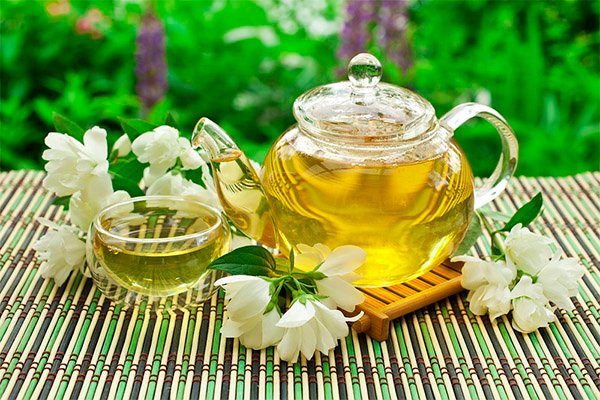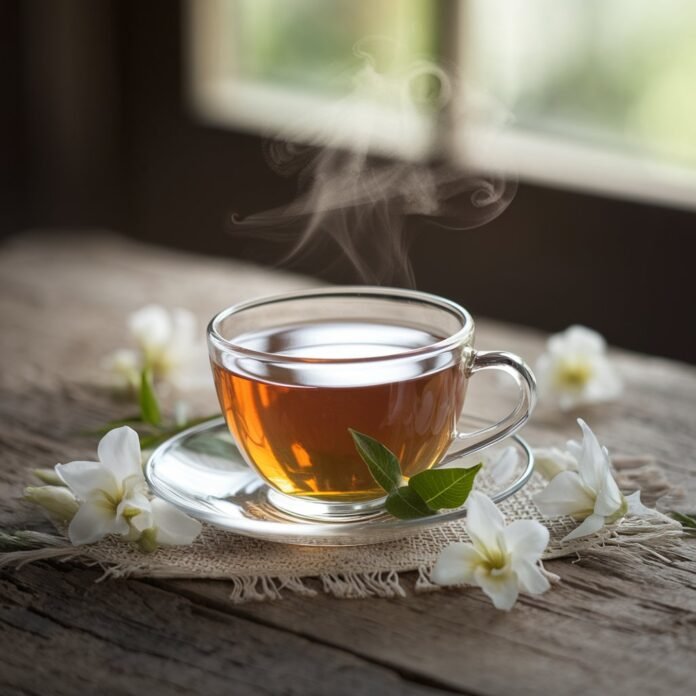Introduction
Jasmine tea is a fragrant and flavorful beverage that has been cherished for centuries. Known for its aromatic qualities and health benefits, jasmine tea is often made by blending green tea with jasmine blossoms. This comprehensive guide will delve into the history, health benefits, types, preparation methods, and much more about jasmine tea. We aim to provide a detailed and informative article that surpasses existing content on the web and ranks highly in search engine results.
“Jasmine tea made from green tea may lower your risk of type 2 diabetes. It contains the compound EGCG, which may help your body use insulin more effectively, potentially improving blood sugar control.”
What is Jasmine Tea?
Jasmine tea is a type of scented tea, typically made from green tea leaves that are infused with the aroma of jasmine flowers. The tea has a delicate floral flavor, making it a popular choice among tea enthusiasts.
The production of jasmine tea involves layering tea leaves with fresh jasmine blossoms, allowing the tea to absorb the flower’s fragrance. This process is repeated several times to achieve the desired intensity of the jasmine scent.
History of Jasmine Tea
Jasmine tea has a rich history that dates back over a thousand years. Originating in China during the Song Dynasty (960-1279 AD), jasmine tea quickly became popular among the Chinese elite. The practice of scenting tea with jasmine blossoms was an art form, and the best jasmine teas were reserved for the imperial family and high-ranking officials.
Over time, jasmine tea spread to other parts of Asia and eventually to the Western world, where it gained popularity for its unique flavor and potential health benefits.
Types of Jasmine Tea
There are several types of jasmine tea, each with its own distinct characteristics:
- Jasmine Green Tea: The most common type of jasmine tea, made from green tea leaves infused with jasmine blossoms. It has a light and refreshing flavor with a floral aroma.
- Jasmine White Tea: A delicate and rare type of jasmine tea made from young tea leaves and buds. It has a subtle flavor and a smooth texture.
- Jasmine Black Tea: Made by blending black tea leaves with jasmine flowers, this type of tea has a stronger flavor and a more robust aroma.
- Jasmine Oolong Tea: A partially fermented tea that combines the floral notes of jasmine with the complex flavors of oolong tea. It is known for its smooth and balanced taste.
Health Benefits of Jasmine Tea
Jasmine tea is not only known for its delightful taste but also for its numerous health benefits. Some of the key health benefits include:
- Rich in Antioxidants: Jasmine tea is rich in antioxidants, particularly catechins, which help protect the body from free radicals and reduce the risk of chronic diseases.
- Promotes Heart Health: The antioxidants in jasmine tea may help lower cholesterol levels and reduce the risk of heart disease.
- Aids in Weight Loss: Jasmine tea made from green tea leaves may help boost metabolism and promote fat burning, making it a popular choice for those looking to lose weight.
- Improves Digestive Health: Jasmine tea can aid in digestion and relieve digestive issues such as bloating and indigestion.
- Reduces Stress and Anxiety: The calming aroma of jasmine tea can help reduce stress and anxiety, promoting relaxation and mental well-being.
- Supports Immune System: The antioxidants and anti-inflammatory properties of jasmine tea may help strengthen the immune system and protect against infections.
- Regulates Blood Sugar Levels: Jasmine tea made from green tea may help lower the risk of type 2 diabetes by regulating blood sugar levels.

How to Prepare Jasmine Tea
Preparing jasmine tea is a simple process, but it requires attention to detail to achieve the perfect cup. Here’s a step-by-step guide:
- Choose the Right Tea: Select high-quality jasmine tea leaves for the best flavor and aroma.
- Measure the Tea: Use approximately one teaspoon of jasmine tea leaves per cup of water.
- Heat the Water: Heat water to around 160-180°F (70-80°C) for green or white jasmine tea, and 190-200°F (90-95°C) for black or oolong jasmine tea. Avoid using boiling water, as it can scorch the delicate tea leaves.
- Steep the Tea: Pour the hot water over the tea leaves and let it steep for 2-4 minutes, depending on the type of jasmine tea. Steeping for too long can result in a bitter taste.
- Strain and Serve: Strain the tea leaves and pour the tea into a cup. Enjoy the fragrant aroma and delicate flavor.
Jasmine Tea and Its Cultural Significance
Jasmine tea holds a special place in many cultures, particularly in China, where it is often served during ceremonies and special occasions. In traditional Chinese medicine, jasmine tea is believed to have cooling properties and is used to balance the body’s energy.
In Western cultures, jasmine tea has gained popularity for its health benefits and unique flavor, often being served in upscale restaurants and tea houses.
How to Store Jasmine Tea
Proper storage is essential to maintaining the freshness and flavor of jasmine tea. Here are some tips:
- Keep It Airtight: Store jasmine tea in an airtight container to prevent exposure to air, which can cause the tea to lose its flavor.
- Avoid Light: Keep the tea away from direct sunlight, as light can degrade the quality of the tea leaves.
- Store in a Cool Place: Store the tea in a cool, dry place to preserve its freshness.
- Use Within a Year: For the best flavor, use jasmine tea within a year of purchase.
Jasmine Tea in Modern Times
Today, jasmine tea is enjoyed by tea lovers around the world. It is available in various forms, including loose leaves, tea bags, and even ready-to-drink bottles. The popularity of jasmine tea has also led to the creation of jasmine-flavored products, such as ice cream, pastries, and cocktails.
Jasmine Tea and Sustainability
As the demand for jasmine tea grows, there is an increasing focus on sustainable and ethical tea production. Many tea producers are adopting organic farming practices and fair trade certifications to ensure that jasmine tea is produced in an environmentally friendly and socially responsible manner.
FAQs About Jasmine Tea
- What is jasmine tea good for? Jasmine tea is good for promoting heart health, aiding in weight loss, improving digestive health, reducing stress, and supporting the immune system.
- Can you drink jasmine tea every day? Yes, jasmine tea can be enjoyed daily. However, moderation is key, especially if the tea contains caffeine.
- Is jasmine tea high in caffeine? The caffeine content in jasmine tea depends on the type of tea used. Jasmine green tea typically contains less caffeine than jasmine black tea.
- How does jasmine tea taste? Jasmine tea has a delicate floral flavor with a slightly sweet and fragrant aroma.
- Can jasmine tea help with weight loss? Jasmine tea, particularly when made from green tea, may help with weight loss by boosting metabolism and promoting fat burning.
Conclusion
Jasmine tea is more than just a beverage; it’s an experience that combines rich history, cultural significance, and numerous health benefits. Whether you’re a seasoned tea drinker or new to the world of tea, jasmine tea offers a delightful and refreshing way to enjoy a moment of tranquility. With its unique flavor, aromatic qualities, and potential health benefits, jasmine tea is a perfect addition to your daily routine.
This comprehensive guide to jasmine tea is designed to provide you with all the information you need, from its history and health benefits to preparation tips and storage advice. By surpassing the quality of existing online sources, we aim to offer a resource that ranks highly in search engine results and provides valuable insights to tea lovers around the world.
Embrace the elegance of jasmine tea and discover the joy it can bring to your life.




